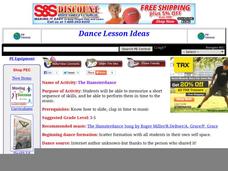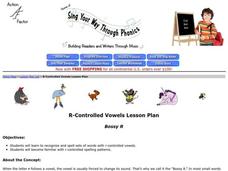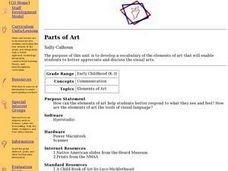Compton Unified School District
How Can We Locate Places?
How can we locate places? Maps, of course! Expose second graders to the tools available in maps and discuss how these tools can help people find locations. Students also look at communities, including what makes a community and the...
Curated OER
Exploring Magnets and Magnetism
Here is a very good lesson plan on magnets, magnetism, and magnitic fields that is chock full of great activities for you to implement with your young scientists. Learners discover the properties of magnets, look at the forces of...
Curated OER
The Hamsterdance
It's unbelievable that there really is a dance that goes with a song called "The Hamsterdance!" This is not a lesson plan per se, but rather steps to the dance. They include head bobs, slide steps, thigh slaps, and clapping. Short dances...
Center for Learning in Action
Introduction to the States of Matter
Liquids, gases, and solids are the states of matter in which scholars investigate in a lesson plan that offers in-depth information and engaging activities that look into the three states and the changes their properties make when mixed...
Curated OER
The Alphabet of Coins
Young scholars use letter/sound relationships of initial consonants to complete sentences that follow a given repeating pattern. These sentences be based on coin terms found on the U.S. Mint H.I.P. Pocket Change™ Web site.
Curated OER
Take a Trip on the Chandelier
Young scholars discuss the lines, shapes, and patterns used to decorate a 19th-century chandelier that was made to look like a hot-air balloon. In this art lesson students discuss the chandelier and then create a papier-mâché sculpture...
Curated OER
Block It Game
Pupils use problem solving strategies such as guess and check and visualization to play the game. They use mental mathematics to decide on the placement of pattern blocks and look for patterns.
Curated OER
Cannon Balls
Second graders investigate 2 and 3 dimensional objects. They discuss the characteristics of the triangle. Students create sequential patterns and describe the rule for their pattern.
Lesson This!
Math Lesson Plan: Bingo Dabbing by 5's
Those extra large markers or "bingo dabbers" are so much fun to play with! Let learners use them to dab groups of five and practice skip counting by 5s to 100 or to 200.
Curated OER
Look At Those Leaves!
Students collect, observe, sort, and measure leaves. In this leaf instructional activity, students take a walk to collect leaves. They bring the leaves back into the classroom to observe, sort, and measure them. They visit a website to...
Exploratorium
The Four-Square Quilt
Youngsters recognize that triangles can be combined together to make various shapes. The learning activity provides a series of seven steps that engage children in applying transformations to triangles. Pupils use a quilt template and...
Curated OER
Patterns in Fruits and Vegetables
Students predict, examine and record the patterns in a variety of fruits and vegetables.
Curated OER
Hey, Look Me Over!
Students make observations about mealworms using hand lenses, rulers, and cotton swabs. Students complete their own mealworm observation chart, then they share their observations with the class. This is one station out of five in an...
Curated OER
Understanding the Poem
Practice literary analysis with your poetry pupils using the mysterious narrative poem "The Listeners." They examine the archaic language and answer 12 comprehension and analysis prompts. Foster creativity with these referential...
DK Publishing
Counting Caterpillars
These caterpillars each have a number sequence printed on their segmented bodies, but some numbers are missing! Look at the completed caterpillars as an example, asking kids to notice a possible pattern. They should observe that the...
Curated OER
Array Bingo
Students recognize patterns in arrays and repeat these patterns back to the teacher. They determine and tell the teacher the total number of squares in the array based on the pattern they recognize.
Curated OER
Interpreting Data from Birdfeeders
What kinds of birds live in your area? Read a book about birds to your learners and explore their feeding patterns. Charts and graphs are provided in this three page packet, but consider assigning the basic questions if using with young...
Curated OER
Counting to 100: Step-by-Step
Introduce your pupils to the hundreds chart! This pair of worksheets is designed to walk them through the patterns they see in the chart as they count by ones and 10s. They fill in missing numbers on a hundreds chart, using guided steps....
Curated OER
Decomposing Numbers Step-By-Step
Here are two addition-related exercises. However, bear in mind, the explanations are featured below each of them. Use this as an all-class warm up, revealing the explanations if and when you see fit. First, examine the four sets of...
Curated OER
Investigation-Reasoning and Proof
The class explores even and odd numbers.They discuss the results when even numbers are added and when odd numbers are added together. Then work in pairs to find other odd and even pattern examples.
Curated OER
Sing Your Way Through Phonics Lesson Plan
Students recognize and spell sets of words with r-controlled vowels. They become familiar with r-controlled spelling patterns.
Curated OER
Life Comes in Cycles
Kids are fascinated by chickens and their eggs. Here is a learning exercise has young learners take a look at the four stages in a chicken's life cycle. They have four cycles to organize: egg, chick, young bird, and adult. They have to...
Curated OER
Parts of Art
Young scholars define and use new vocabulary associated with the elements of art. As a class, they brainstorm different ways in which we communicate with one another. In groups, they view different pieces of art from the Native American...
Curated OER
Shake With A
Use letter boxes and letter tiles (d,a,y,l,p,w,k,f,r,i,t,s,b,c,I) to help your class distinguish between the sounds for short vowel a and long vowel a. They are introduced to the vowel patterns that comprise long vowel sounds, with a...























